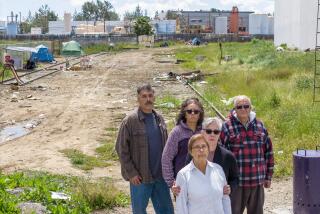Mine operator accused of abusing safety appeals process
- Share via
Reporting from Washington — The company that operated the West Virginia coal mine where an explosion killed 29 miners this month was able to “game the system” by using a lengthy appeals process to avoid safety shutdowns, witnesses told a Senate committee Tuesday.
Massey Energy Co., which was cited 515 times for safety violations at the Upper Big Branch mine last year and 124 times this year before the April 5 explosion, was able to continue mining coal. Many of the violations were for improper ventilation of methane and coal dust, the suspected causes of the worst U.S. mine disaster in 40 years.
Because of loopholes in safety laws and a backlog of 16,000 safety violation appeals, federal inspectors are unable to shut down unsafe mine sections for more than short periods. The average appeal process drags on for 600 days, allowing coal companies to continue mining despite repeated safety citations.
And even when inspectors are able to shut down mine sections where inspectors find dangerous conditions, the mines are reopened as soon as operators correct the violations.
“You just about have to have an explosion occur” to force a closure for imminent safety violations, Joe Main, head of the federal Mine Safety and Health Administration, told the Senate Committee on Health, Education, Labor and Pensions.
The hearing, the first since the disaster, was attended by family members of miners killed in other mine disasters, who held up photographs of their loved ones.
The panel heard a mine workers’ union leader angrily accuse Massey of knowingly operating unsafe mines and of intimidating miners who complained about dangerous working conditions.
“The miners who work for Massey are scared to death,” said Cecil Roberts, president of the United Mine Workers, his face reddening in anger. “They’re intimidated. This company is run like it’s 1921, not like it’s the present day.”
No Massey officials attended the hearing. A representative of the National Mining Assn., an industry group, told the committee that current federal regulations are adequate to insure mine safety.
“The tools are sufficient when properly used,” said Bruce Watzman, the association’s senior vice president.
Watzman pledged to work with Congress to eliminate the appeals process backlog, which he said “does not serve the interest of miners or mine operators.”
Massey, which operated the Upper Big Branch mine under a subsidiary, was hit with $1.24 million in penalties for safety violations there between January 2009 and the April 5 disaster, but paid only $180,000 because fines are not due until appeals are exhausted. Some fines imposed in 2006 still have not been paid by Massey, which contested 78% of its assessed penalties in its mines in 2009.
And even those fines that have gone unpaid would be a pittance for a multibillion-dollar company like Massey.
“Unfortunately, the penalties for breaking the law are often so minimal that employers can dismiss them as simply the cost of doing business,” said Sen. Tom Harkin (D-Iowa), who chairs the committee.
Sen. John D. Rockefeller IV (D-W.Va.), holding up a 26-page sheaf of citations found at the Upper Big Branch mine since January 2009, called for “an end to the loopholes in the law that allow some mines to put profits over safety.”
But when Main was asked why his agency had never used existing authority to shut down an unsafe mine, his response left senators baffled.
“That’s a good question,” Main replied.
Main repeated his earlier descriptions of regulations he said are too weak to allow inspectors to impose meaningful penalties and shutdowns.
Last year, federal inspectors issued 48 withdrawal orders requiring miners to evacuate dangerous sections at Upper Big Branch, but Massey was able to stall a shutdown of the mine.
“It’s very easy to game the system,” Main said, describing what he called a “catch me if you can mentality” among mine operators.
President Obama, who demanded a detailed report of violations at Upper Big Branch that was delivered earlier this month, has described a system “so riddled with loopholes that they allow unsafe conditions to continue.”
Labor Secretary Hilda L. Solis, who oversees the mine safety agency, has said of current regulations: “You could drive a truck through the loopholes that exist.”
Tom Hamburger in the Washington bureau contributed to this report.
More to Read
Sign up for Essential California
The most important California stories and recommendations in your inbox every morning.
You may occasionally receive promotional content from the Los Angeles Times.











